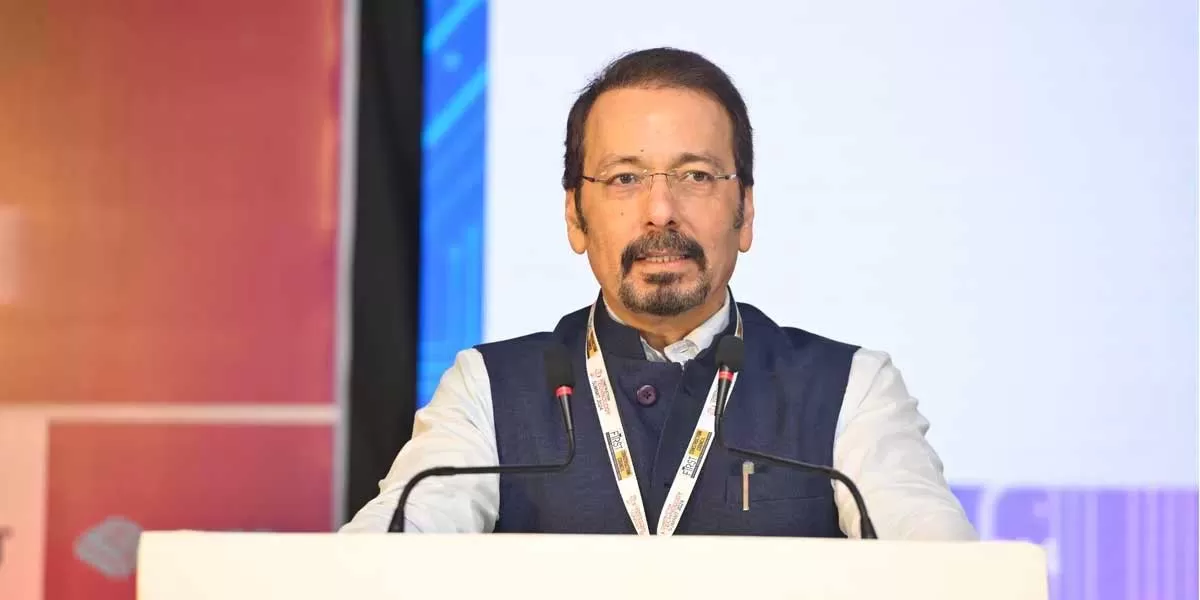The 4th Construction Technology Summit (CTS 2024) was hosted by the First Construction Council (FCC) and CONSTRUCTION WORLD magazine at Hotel Sahara Star in Mumbai. “New technology is transforming the way buildings are designed, engineered, built and managed,” said Pratap Padode, Founder and Editor-in-Chief, ASAPP Media, discussing how innovations previously deemed impractical are now essential for tackling complex infrastructure projects and the transformative impact of new technologies. “Precast, modular construction or even advanced technology like 3-D printing, robotics, artificial intelligence and machine learning can deliver business benefits, whether one is designing sustainable houses or reimagining the infrastructure of entire cities. The precision achieved through software and factory processes allows for optimal use of materials, minimising waste across building modules. This shift towards more sustainable practices underscores the industry’s commitment to reducing its environmental impact.”Tech talkEmphasising upon the critical need for skilled professionals and workforce innovation, Prof Anil Kashyap, President and Chancellor, NICMAR University, said, “As construction projects grow increasingly sophisticated, it’s essential that we address the skill gap and integrate new tools and methodologies into our curriculum to ensure that graduates are equipped with the latest planning software and techniques, ready to meet the demands of the workforce from day one.”Voicing another industry concern, Awanish Shukla, Assistant General, DLF India, said, “Offside construction demand in India has not been picking up as fast compared to other parts of the world.” Noting a shift towards an increasing number of companies prioritising modular construction, he urged major contractors and developers to embrace modular techniques that reduce construction time and are also cost-effective to support 2047’s Viksit Bharat Plan.” “Imagine pouring an entire room in a single pour, eliminating joints and potential leakages,” said SJ Vijay, Founder and Chairman, Salmon Leap Ventures, highlighting the potential of 3-D monolithic modular precast techniques – a necessary paradigm shift in India’s construction methods for a massive manufacturing leap. He suggested that buildings should be manufactured rather than simply constructed.In agreement, VS Adithya, CEO, Tvasta, said, “We are essentially building a city the size of Chicago each year and most of these structures fall within our current scope,” envisioning a future where 3-D printing will gain considerable traction over the next 10 to 20 years. That said, he rued, “Construction remains one of the least automated sectors.” Emphasising the significant untapped potential for automation in the sector, he noted that it lags behind other manufacturing industries globally and attributed this to a lack of adaptation of automated elements to site conditions.For his part, SP Rajan, Vice President and Head of Plant and Machinery, L&T Construction, said. “Complicated excavations have become much easier thanks tothe adoption of 3-D technology,” while discussing the significant productivity gains achieved through implementation of a 3-D system on a recent airport project. He noted that the use of 3-D technology led to a nearly fourfold increase in productivity, particularly with graders.Meanwhile, Mandeep Singh, Chief Operating Officer - Engineering & Contracting, Casagrand Contracts, noted, “Modular building is not a new concept but significant hurdles, particularly the regulatory framework, remain. As we explore this area further, we will gain a clearer understanding and be able to tackle these challenges more effectively.”Other viewpointsCalling upon the construction sector to seize the opportunity by developing compliant landing sites even as he announced the development of an electric vertical takeoff and landing (eVTOL) aircraft, Prof Satya Chakravarthy, Founder and CEO, ePlane, said, “The most affordable electric air taxi in the market will reduce travel times by up to eight times and cost about two times’ an Uber fare.”“Many contractors are now using advanced radar automation and control systems to enable machines such as graders, excavators and compactors to operate using 3-D models or even simple 2D AutoCAD files,” said Anand Sirohi, Director, Key Accounts and Large Projects, Trimble, emphasising the key role of mechanisation in enhancing project efficiency in construction projects, whether vertical buildings or horizontal roadworks, noting that innovation has nearly doubled productivity.“Leveraging a sophisticated database to integrate systems with CNC machines has eliminated the need for traditional shop drawings, streamlining production processes and enabling the efficient manufacture of components,” pointed out Dr Sanjay Gambhir, Executive Director, AECOM. Similarly, he advocated for digital solutions to reduce both project costs and timelines. “Creation of interactive, customised dashboards provide better insights and assist site correspondents in digitising daily progress reports, health and safety checklists, quality assessments and non-conformance reports,” said Siddharth Jadhav, Senior Consultant, Digital Transformation, Cube. He highlighted how digital strategies can enhance infrastructure development, noting how these advancements have led to the development of digital twins – accurate replicas of projects that enable comprehensive tracking of asset data.Parag Raut, Senior Area Business Development Manager, Tata Steel, added, “The use of digital technologies and digital twins in the planning and design phases will reduce construction costs and ultimately benefit the industry and the economy.”“The past decade has seen significant barriers being dismantled and I believe the future of innovation in India is promising,” averred Atul Bhobe, Managing Director, TPF Engineering. He compared the shift to Newton’s Law, saying that while some bureaucratic resistance to innovation in India remains, it is rapidly declining. “The future is in good hands.”“Wasting steel, a vital natural resource, is increasingly viewed as a crime from a sustainability standpoint,” said Parag Raut about the significant issue of steel wastage in the sector. “Typical wastage rates can exceed 8 per cent in some cases,” he added, emphasising upon the need for more responsible resource management in construction.“It’s crucial to also address how these innovations can help mitigate carbon emissions,” commented Yash Pratap Singh, Partner, Business Consulting, KPMG, underlining the importance of integrating sustainable practices with technological developments.The way aheadNoting the multifaceted nature of urban development, Samir Shaikh, Head - Cities, Places and Architecture, Jacobs, said, “When we talk about cities, there are many aspects to consider, including capital, social dynamics and governance.” However, he emphasised that infrastructure remains a key focus area, covering essential elements such as energy, transportation and building design within the built environment. Presenting the need for a people-centric approach to urbanisation in India, he added, “At the end of the day, while creating cities of the future, we must prioritise making cities more people-centric since they are for the people.”This impressive lineup of speakers showcased the entire gamut of construction technologies being adopted for city planning as well as materials and digital technologies that will change our lives. “Over the last decade, we have seen a remarkable acceleration in technology adoption in the construction sector,” summed up Padode, contrasting this progress with a previous McKinsey report that identified the industry as one of the slowest to embrace technological advancements. “This rapid adoption and integration of advanced technologies are not just helping us meet deadlines – they are reshaping the very landscape of urban infrastructure in India.”


















